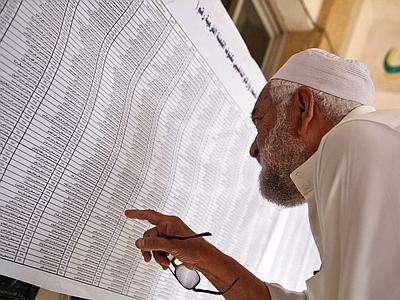Commentary
From 2011 to now, it’s been a downward spiral for Egyptians
This is the way a dysfunctional regime, prey to its own paranoia, governs a country that is frustrated and hopeless. Not going to vote is the only form of protest that the Egyptian people can nowadays afford.

It’s a similar situation to the one in Russia a week ago: the only thing that will be truly important in the Egyptian elections will be the turnout. With only two candidates, one of whom is plainly just going through the motions, President Abdel Fattah el-Sisi will be re-elected by something like a referendum.
But it will be a referendum only in relative terms, at least according to the images coming in from Cairo Monday: the near-empty polling stations gave the photographers of pro-government newspapers little to work with, and they only managed to save face at the end of the day thanks to the improvised dances put on by groups of government supporters.
Data from recent years confirms the trend: the turnout for the 2015 administrative elections fell below 30 percent, at similar levels to those in the Mubarak era, and well below the 51.85 percent of the 2012 presidential elections, when the winner was the Islamist Morsi.
It looks like the current situation is light years away from the enthusiasm and the desire for participation that the Revolution of Jan. 25, 2011, brought with it, an event that managed to dispel the apathy of a people living under prolonged dictatorship. Today, hope is once again not anywhere in view, with a regime that employs a mode of governing that is a carbon copy of the previous one: repression, few possibilities for self-expression, a tightly controlled media, an economy in the hands of the military elite, and the increasingly frequent use of the death penalty.
But it is even worse than before, according to the Egyptians themselves: with an average of two forced disappearances per day and an estimated 60,000 political prisoners (which required the rushed construction of 16 new prisons), the repression machine operates in a much more systematic way.
The machine swallows up activists and journalists, but also ordinary citizens: from the mother who denounced the disappearance of her daughter to the singer Sherine, who dared to joke about the Nile. Even the “tuk tuk graduate,” a driver who complained about inflation skyrocketing in a viral video in late 2016, seems to have chosen to disappear of his own initiative before it happened to him.
It is a two-speed country, or a two-faced one, which can be vividly seen in the Pharaonic projects that el-Sisi continues to launch while nearly 30 percent of the population lives below the poverty line. The austerity measures introduced to secure a loan of $12 billion from the International Monetary Fund have hit only the lower and middle classes, in the form of subsidy cuts, increased taxes and VAT, and a reduction in government jobs, while the government is planning brand new megacities (Neom in partnership with Saudi Arabia, and New Cairo just outside the capital).
It is a severe economic crisis, for which Riyadh is providing assistance with substantial funding that is transforming Egypt into a vassal state, and which is accompanied by another sword of Damocles: the ongoing state of emergency.
For a year now, since the bloody attack against Coptic churches on Palm Sunday, the state of emergency has been extended to the whole country. Cities are on lockdown, demolitions of houses and land confiscations along the east coast and in Rafah are proceeding at an accelerated pace, and the application of the freedom-killing anti-terrorism law is becoming even stricter—the first initiative of el-Sisi after the coup, which practically outlawed any form of protest, political, social or economic.
El-Sisi does not intend to make the same “error” as Mubarak, who in the years before his fall allowed the bare minimum of an opposition and a free press. Better to salt the earth before anything like that can take root. And then there is the case of the Sinai Peninsula, completely isolated for almost two months by the “Sinai 2018” military operation against terrorism of Islamic origin.
One cannot enter or exit the area without special permits, food is scarce, and the few army trucks that distribute flour, vegetables, and eggs are besieged by hungry communities. This is the way a dysfunctional regime, prey to its own paranoia, governs a country that is frustrated and hopeless. Not going to vote is the only form of protest that the Egyptian people can nowadays afford.
Originally published at https://ilmanifesto.it/un-plebiscito-vuoto-nellegitto-a-due-velocita/ on 2018-03-27
